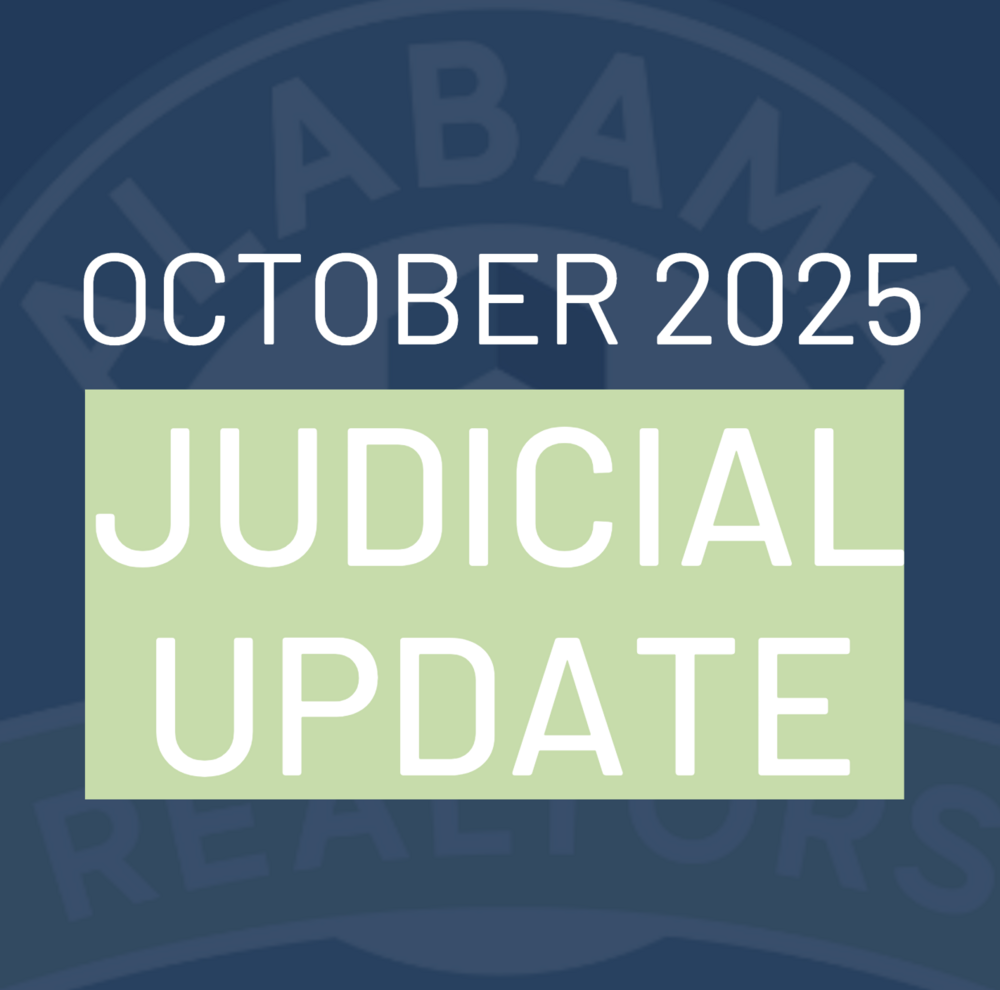
October 2025 Judicial Update
October 29, 2025
Our state and federal appellate courts stay busy hearing cases all year long. AAR’s Legal Team has compiled information about the cases that impact the real estate industry. Read on to learn more.
Arbitration
Arbitration clauses are a regular topic of discussion for the appellate courts, including in Franklin Structures, LLC v Williams and Williams (Ala. 2025). In that case, the Williamses bought a manufactured home from Franklin. After the home was built, the Williamses discovered a number of structural issues. They filed a claim under the home’s warranty and some minor problems were fixed, but the major ones were not. Eventually, the Williamses sued Franklin.
In response, Franklin filed a demand for arbitration, which was based on an arbitration clause in the Homeowner’s Manual that had been provided to the Williamses. The Williamses argued, among other things, that the arbitration clause was of no effect because they hadn’t signed the Homeowners Manual or any other contract that contained the arbitration clause. The Alabama Supreme Court ultimately disagreed with the Williamses and found that the arbitration clause was enforceable. Although the Williamses hadn’t signed the Homeowner’s Manual, they had taken advantage of the warranty provisions contained in it by filing a claim with Franklin. Citing existing caselaw, the Court stated that “[a] plaintiff cannot simultaneously claim the benefits of a contract and repudiate its burdens and conditions.” Franklin at 19, citing Springhill Nursing Homes, Inc. v McCurdy, 898 So.2d 694, 698-99 (Ala. 2004). Since the Williamses invoked the warranty contained in the Homeowner’s Manual, they couldn’t claim ignorance of the arbitration clause contained in the same place.
Lease-to-Own Agreements
The Alabama Supreme Court recently considered a case involving a lease-to-own agreement, McCain v Sneed and Smoot (Ala. 2025). In that case, the Sneed and Smoot rented property from McCain, with the agreement that ownership would eventually be transferred to the them after certain conditions had been met. Unfortunately, at some point, a dispute arose, and McCain argued that the agreement was no longer valid. The Circuit Court ruled in favor of the tenants (Sneed and Smoot), and McCain appealed.
On appeal, McCain first argued that the tenants had breached the lease. Specifically, during one year of the lease, the tenants failed to pay the property’s taxes within 20 days of them being due, and the same was true of that same month’s rent. However, as to the taxes, the lease agreement didn’t specify when the money was due to McCain. As to the rent, the record reflected that the tenants had contacted McCain on two separate occasions (as was required by the lease agreement) to inquire about when to bring the rent, but McCain never responded to them. The Court noted that, “[a] party to a contract who has caused a failure of performance by the other party cannot take advantage of that failure." Id. at 13, citing Big Thicket Broad. Co. of Alabama v. Santos, 594 So. 2d 1241, 1244 (Ala. Civ. App. 1991). Because McCain requested that the tenants contact her about payments and then failed to respond to them when they did, the Alabama Supreme Court sided with the tenants.
McCain also argued that the Circuit Court erred by applying the tenants monthly rent payments toward the cost of the property because the lease agreement did not say they would be applied in this way. Instead, the lease required that the tenants pay an initial deposit as well as annual payments toward the cost of the property. Because the lease agreement did not specifically state that the monthly rent payments would be applied toward the property’s cost, the Alabama Supreme Court sided with McCain. This ruling demonstrates the critical importance of a carefully drafted lease agreement.
Further Reading
The appellate courts have released several opinions lately that relate to real estate, but hinge upon legal procedural issues or other issues outside the scope of this article. These cases can be viewed at the following links: Englund, Englund, and Georgetown Contractors, LLC v Dauphin Island Property Owners Association (Ala. 2025); Ex parte Sansoms (Ala. 2025); Campus Crest at Tuscaloosa LLC et al. v City of Tuscaloosa (Ala. 2025); Restore with Apex, Inc. v Rocca (Ala. 2025); City of Orange Beach v Boles (Ala. 2025); Del Vecchio et al. v Board of Commissioners of the City of Dothan and City of Dothan (Ala. Civ. App. 2025); Morris v Lazzari and Lazzari (Ala. Civ. App. 2025); James and Son Metal Products, Inc. and McCreless Holdings, LLC v Renasant Bank (Ala. Civ. App. 2025).